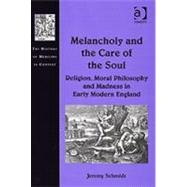Melancholy and the Care of the Soul: Religion, Moral Philosophy and Madness in Early Modern England
, by Schmidt,Jeremy- ISBN: 9780754657484 | 0754657485
- Cover: Hardcover
- Copyright: 3/28/2007
Jeremy Schmidt reminds us that melancholy and depression have rarely been mere disorders of the body or the mind, that they affect the whole person and display moral, religious, cultural and social dimensions. Through a study of seventeenth- and eighteenth-century English writers, including physicians such as Thomas Willis and George Cheyne, Anglicans such as Simon Patrick, and nonconformists such as Richard Baxter, he helpfully focuses our attention upon the religious and moral dimensions of souls in anguish. It was only later that an exclusively medical language suppressed the languages of consolation. He suggests that priests and philosophers need to be brought back into the care of the melancholy.H. C. Erik Midelfort, Professor of History and Religious Studies, University of Virginia "Melancholy and the Care of the Soul is an original and important reassessment of madness and religion in early modern England. Jeremy Schmidt gracefully elucidates the intertwining of medicine, religion, and moral philosophy in the creation of the melancholic individual, whose "disease of the soul" was a product of the wider cultural crisis of the seventeenth century. Highly recommended." Anita Guerrini University of California, Santa BarbaraMelancholy is rightly taken to be a central topic and concern of early modern culture, and it continues to generate scholarly interest among historians of medicine, literature, psychiatry, and religion. This book considerably furthers our understanding of the issue by examining the extensive discussions of the treatment of melancholy provided in seventeenth and eighteenth century religious and moral philosophical publications, many of which have received only scant attention from modern scholars.Arguing that melancholy was considered by many early modern writers to be as much a disease of the mind as a condition which originated in some physiological disturbance, Dr Schmidt reveals how religious consolation and spiritual confession were employed as important elements of the treatment. This underlines a common contemporary view that mental illness was regarded as in some way related to a sinful condition, rather than a guiltless medical problem. The book also explores ways in which the language used to express and treat melancholy shaped the experience of melancholy and its behavioural manifestations, suggesting that the use of religious languages to treat the condition could enable the sufferer to conceive of themselves as struggling with the kinds of moral and spiritual problems that beset their contemporaries.As a study in intellectual history, Melancholy and the Care of the Soul offers new insights into early modern texts on melancholy, including dramatic and literary representations of melancholy and melancholic suffering, and critically engages with a broad range of current scholarship dealing with early modern medical, religious and cultural issues.Contents: Introduction: Melancholy, language, and madness; Therapeutic languages: ancient moral philosophy and patristic Christianity; Melancholy among the passions in 17th-century thought; The pastoral care of melancholy in Calvinist England; Anglicanism, melancholy and the Restoration critique of 'enthusiasm'; The 'Puritan tradition'? Nonconformist practical divinity and the critique of 'enthusiasm'; From religious despair to hypochondria: the languages of melancholy transformed; Curing Augustan hysterics: morality, politics and religion; Conclusion; Bibliography; Index.About the Author: Jeremy Schmidt is Teaching Fellow at the University of King's College, Canada.







